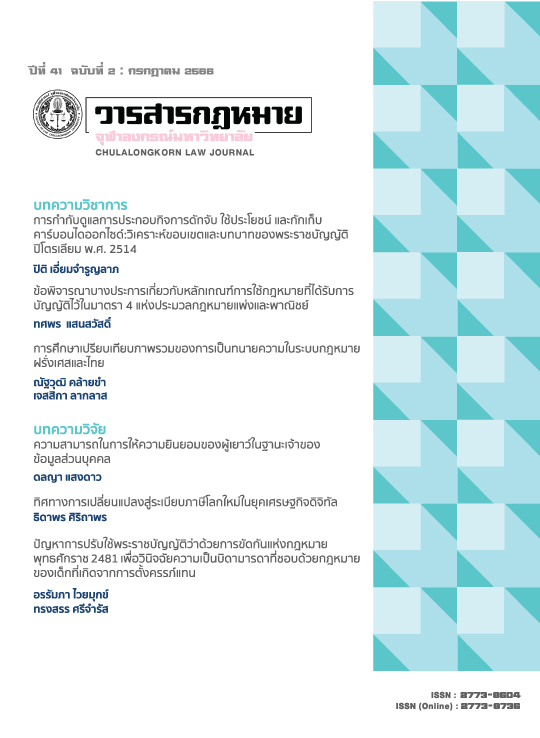ความสามารถในการให้ความยินยอมของผู้เยาว์ในฐานะเจ้าของข้อมูลส่วนบุคคล
Main Article Content
บทคัดย่อ
ผู้เยาว์เป็นบุคคลเปราะบาง เนื่องจากมีความสามารถอย่างจำกัดในการให้ความยินยอมอย่างอิสระ ซึ่งการให้ความยินยอมในการประมวลข้อมูลส่วนบุคคลเป็นเรื่องที่มีความซับซ้อน บทความฉบับนี้จึงมีวัตถุประสงค์ที่จะศึกษาว่ากิจกรรมใดที่ผู้เยาว์สามารถให้ความยินยอมในการประมวลข้อมูลส่วนบุคคลได้โดยลำพัง รวมถึงความเหมาะสมของกำหนดอายุของผู้เยาว์ที่สามารถให้ความยินยอมด้วยตนเอง ตามมาตรา 20 ของพระราชบัญญัติคุ้มครองข้อมูลส่วนบุคคล พ.ศ. 2562 ตลอดจนการนำบทบัญญัติเรื่องนิติกรรมที่ผู้เยาว์สามารถทำได้โดยลำพัง ตามประมวลกฎหมายแพ่งและพาณิชย์ มาตรา 22 มาตรา 23 และมาตรา 24 มาใช้เป็นข้อยกเว้นกรณีที่ผู้เยาว์สามารถให้ความยินยอมในการประมวลข้อมูลส่วนบุคคลด้วยตนเองได้
ผลการศึกษาพบว่า กิจกรรมที่ผู้เยาว์สามารถให้ความยินยอมได้โดยลำพัง ได้แก่ การให้ความยินยอมแก่ผู้ควบคุมข้อมูลส่วนบุคคลในการอนุญาตให้ผู้ปกครองเข้าถึงหรือขอสำเนาข้อมูลส่วนบุคคลแทนผู้เยาว์ ในขณะที่กำหนดอายุของผู้เยาว์ยังมีความไม่สอดคล้องกับหลักการศึกษาทางการแพทย์เกี่ยวกับพัฒนาการด้านความคิดสติปัญญาของผู้เยาว์ และการตีความเพื่อปรับใช้ประมวลกฎหมายแพ่งและพาณิชย์ มาตรา 22 มาตรา 23 และมาตรา 24 ยังมีความไม่ชัดเจนอยู่มาก ผู้เขียนจึงเห็นควรให้มีการนำหลักการของกฎหมายคุ้มครองข้อมูลส่วนบุคคลของประเทศสหรัฐอเมริกา สหภาพยุโรป ประเทศอังกฤษ และประเทศจีน ซึ่งมุ่งคุ้มครองการทำกิจกรรมออนไลน์ของผู้เยาว์ ในเรื่องความสามารถและกำหนดอายุในการให้ความยินยอมของผู้เยาว์ ตลอดจนมาตรฐานในการตรวจสอบความยินยอมของผู้ปกครอง มาพัฒนาและปรับปรุงพระราชบัญญัติคุ้มครองข้อมูลส่วนบุคคล พ.ศ. 2562 ของประเทศไทยต่อไป
Article Details

อนุญาตภายใต้เงื่อนไข Creative Commons Attribution-NonCommercial-NoDerivatives 4.0 International License.
ลิขสิทธิ์และเนื้อหาในเว็บไซต์ของวารสารกฎหมาย (รวมถึง โดยไม่จำกัดเฉพาะ เนื้อหา รหัสคอมพิวเตอร์ งานศิลป์ ภาพถ่าย รูปภาพ ดนตรีกรรม โสตทัศนวัสดุ) เป็นกรรมสิทธิ์ของวารสารกฎหมาย และผู้ได้รับการโอนสิทธิทุกราย
1. วารสารกฎหมาย ให้อนุญาตให้คุณใช้สิทธิอันไม่เฉพาะเจาะจงที่สามารถถูกถอนเมื่อใดก็ได้ โดยไม่มีค่าใช้จ่าย ในการ
- เยี่ยมชมเว็บไซต์และเอกสารในเว็บไซต์นี้ จากคอมพิวเตอร์หรือเครื่องมือสื่อสารผ่านเว็บบราวเซอร์
- คัดลอกและจัดเก็บเว็บไซต์และเอกสารในเว็บไซต์นี้บนลงคอมพิวเตอร์ของคุณผ่านระบบความจำ cache
- สั่งพิมพ์เอกสารจากเว็บไซต์นี้สำหรับการใช้ส่วนตัวของคุณ
- ผลงานที่ได้รับการตีพิมพ์โดยวารสารกฎหมาย จุฬาลงกรณ์มหาวิทยาลัย ถูกคุ้มครองภายใต้ Creative Commons Attribution 4.0 International License ซึ่งอนุญาตให้ทุกคนสามารถคัดลอก แจกจ่าย ดัดแปลง ส่งต่อ ผลงานได้ ก็ต่อเมื่อผลงานและแหล่งข้อมูลได้รับการอ้างอิงอย่างเหมาะสม
2. วารสารกฎหมาย จุฬาลงกรณ์มหาวิทยาลัย สงวนสิทธิ์ไม่อนุญาตให้คุณใช้สิทธิอื่นใดที่เกี่ยวข้องกับเว็บไซต์และเอกสารบนเว็บไซต์นี้ เช่น การคัดลอก ดัดแปลง เปลี่ยนแปลง ส่งต่อ ตีพิมพ์ แจกจ่าย เผยแพร่ จัดแสดงในที่สาธารณะ ไม่ว่าจะในรูปแบบใดก็ตาม ซึ่งเว็บไซต์หรือเอกสารบนเว็บไซต์ โดยไม่อ้างอิงถึงแหล่งข้อมูลหรือโดยไม่ได้รับอนุญาตเป็นลายลักษณ์อักษรจากวารสารกฎหมาย จุฬาลงกรณ์มหาวิทยาลัย
3. คุณอาจขออนุญาตที่จะใช้เอกสารอันมีลิขสิทธิ์บนเว็บไซต์นี้โดยการเขียนอีเมลล์มายัง journal@law.chula.ac.th
4. วารสารกฎหมาย จุฬาลงกรณ์มหาวิทยาลัย เข้มงวดกับการคุ้มครองลิขสิทธิ์อย่างมาก หากวารสารกฎหมาย จุฬาลงกรณ์มหาวิทยาลัยพบว่าคุณได้ใช้เอกสารอันมีลิขสิทธิ์บนเว็บไซต์นี้โดยไม่ถูกต้องตามการอนุญาตให้ใช้สิทธิ ดังที่กล่าวไปข้างต้น วารสารกฎหมาย จุฬาลงกรณ์มหาวิทยาลัยอาจดำเนินคดีตามกฎหมายต่อคุณได้ เพื่อเรียกร้องค่าเสียหายที่เป็นตัวเงินและคำขอชั่วคราวให้คุณหยุดการใช้เอกสารดังกล่าว ทั้งนี้ คุณอาจถูกสั่งให้ชดใช้ค่าใช้จ่ายใดๆ ที่เกี่ยวข้องกับการดำเนินการตามกฎหมายนี้
หากคุณพบเห็นการใช้เอกสารอันมีลิขสิทธิ์ของวารสารกฎหมาย จุฬาลงกรณ์มหาวิทยาลัย ที่ขัดหรืออาจขัดต่อการอนุญาตให้ใช้สิทธิดังที่ได้กล่าวไปข้างต้น โดยเชื่อว่าได้ละเมิดลิขสิทธิ์ของคุณหรือของผู้อื่น สามารถร้องเรียนมาได้ที่ journal@law.chula.ac.th
เอกสารอ้างอิง
Article 17 of Civil Code of the People's Republic of China
Article 28 of Personal Information Protection Law of the People’s Republic of China
Article 31 of Provisions on Online Protection of Children’s Personal Information
Article 8 of Regulation (EU) 2016/679 (General Data Protection Regulation)
Baker McKenzie. Minors. [online] Available from : https://resourcehub.bakermckenzie.com/en/resources/data-privacy-security/asia-pacific/japan/topics/minors [5 March 2022]
European Union Agency for Fundamental Rights. Age of Majority. [online] Available from : https://fra.europa.eu/en/content/age-majority [14 January 2022]
Federal Trade Commission. Children’s Online Privacy Protection Rule: A Six-Step Compliance Plan for Your Business. [online] Available from : https://www.ftc.gov/business-guidance/resources/childrens-online-privacy-protection-rule-six-step-compliance-plan-your-business#step4 [14 January 2022]
Legal Information Institute: Cornell Law School. Legal Age. [online] Available from : https://www.law.cornell.edu/wex/legal_age [14 January 2022]
Ministry of Justice. The Act Partially Amending the Civil Code (Related to Age of Majority). [online] Available from : https://www.moj.go.jp/EN/MINJI/minji07_00218.html#:~:text=On%20June%2013%2C%202018%2C%20a,20%20to%2018%20years%20old [6 March 2022]
Recital 38 of Regulation (EU) 2016/679 (General Data Protection Regulation)
Section 1 of Family Law Reform Act 1969
Section 312.2 of 16 CFR Part 312 - Children’s Online Privacy Protection Act 1998
Section 6501(1) of Children’s Online Privacy Protection Act, 15 U.S.C.
Section 9 of Data Protection Act 2018
Simone Van Der Hof. I Agree, or Do I: A Rights-Based Analysis of the Law on Children's Consent in the Digital World. Wisconsin International Law Journal, 2016.
กิตติศักดิ์ ปรกติ. คำอธิบายวิชากฎหมายแพ่ง : หลักทั่วไป ว่าด้วยบุคคลธรรมดา. พิมพ์ครั้งที่ 2. กรุงเทพมหานคร: วิญญูชน, 2550.
ข้อ 1 กฎกระทรวง ฉบับที่ 2 (พ.ศ.2541) ออกตามความในพระราชบัญญัติข้อมูลข่าวสารของราชการ พ.ศ. 2540
คำพิพากษาศาลฎีกาที่ 1074/2477
คำพิพากษาศาลฎีกาที่ 13745/2553
คำพิพากษาศาลฎีกาที่ 1416/2505
คำพิพากษาศาลฎีกาที่ 214/2494
คำพิพากษาศาลฎีกาที่ 3915/2551
คำพิพากษาศาลฎีกาที่ 5661/2559
คำพิพากษาศาลฎีกาที่ 5982/2551
บันทึกสำนักงานคณะกรรมการกฤษฎีกาประกอบร่างพระราชบัญญัติแก้ไขเพิ่มเติมประมวลกฎหมายอาญา (ฉบับที่ ..) พ.ศ. .... (การกำหนดอายุของเด็กที่เป็นผู้กระทำความผิดทางอาญา) เรื่องเสร็จที่ 485/2550
ภัทริดา สุคุณณี. บทวิเคราะห์รัฐธรรมนูญ เรื่อง สิทธิเด็ก เยาวชน และบุคคลในครอบครัว. (ม.ป.ป.).
มนมาศ สุมโนทยาน. นิติกรรมที่สมแก่ฐานานุรูปแห่งตนและจำเป็นในการดำรงชีพตามสมควรของผู้เยาว์. วิทยานิพนธ์ปริญญามหาบัณฑิต คณะนิติศาสตร์ มหาวิทยาลัยธรรมศาสตร์, 2559.
มาตรา 19 ประมวลกฎหมายแพ่งและพาณิชย์
มาตรา 20 พระราชบัญญัติคุ้มครองข้อมูลส่วนบุคคล พ.ศ. 2562
มาตรา 22 ประมวลกฎหมายแพ่งและพาณิชย์
มาตรา 22 มาตรา 23 และมาตรา 24 ประมวลกฎหมายแพ่งและพาณิชย์
มาตรา 23 ประมวลกฎหมายแพ่งและพาณิชย์
มาตรา 24 ประมวลกฎหมายแพ่งและพาณิชย์
มาตรา 25 พระราชบัญญัติข้อมูลข่าวสารของราชการ พ.ศ. 2540
มาตรา 30 พระราชบัญญัติคุ้มครองข้อมูลส่วนบุคคล พ.ศ. 2562
มาตรา 32 รัฐธรรมนูญแห่งราชอาณาจักรไทย พุทธศักราช 2560
มาตรา 73 ประมวลกฎหมายอาญา ซึ่งแก้ไขเพิ่มเติมโดย มาตรา 3 พระราชบัญญัติแก้ไขเพิ่มเติมประมวลกฎหมายอาญา (ฉบับที่ 29) พ.ศ. 2565
มาตรา 74 ประมวลกฎหมายอาญา
มาตรา 8, 9 คำประกาศสิทธิและข้อพึงปฏิบัติของผู้ป่วย พ.ศ. 2558
รายงานการประชุมคณะกรรมการกฤษฎีกา (คณะที่ 11) ครั้งที่ 5 (30/2561) 24/2561 วันที่ 6 สิงหาคม 2561
ศศิวิมล เสมอใจ. ปัญหาเกี่ยวกับการจำกัดความสามารถของผู้เยาว์ในการทำนิติกรรมสัญญา. วารสารนิติศาสตร์ มหาวิทยาลัยนเรศวร. (ก.ค. - ธ.ค. 2563): 162.
สำนักงานพัฒนาธุรกรรมทางอิเล็กทรอนิกส์. ETDA เผย Gen Y ทวงบัลลังก์ ใช้เน็ตมากสุด เกือบ 8 ชั่วโมงต่อวัน ฮิตสุด ดู LIVE COMMERCE ข้าราชการ-จนท.รัฐ ชนะขาดทุกอาชีพ ใช้เน็ตเกือบ 12 ชั่วโมงต่อวัน. [ออนไลน์] แหล่งที่มา : https://www.etda.or.th/th/pr-news/iub2022.aspx [13 ธันวาคม 2565]


